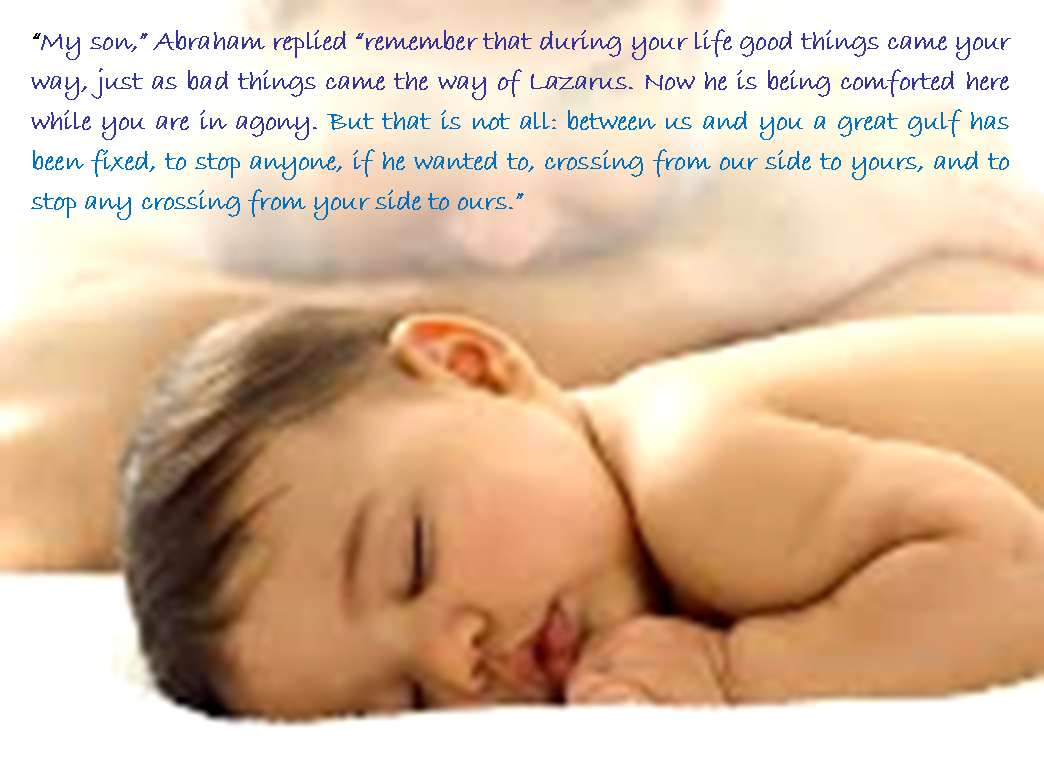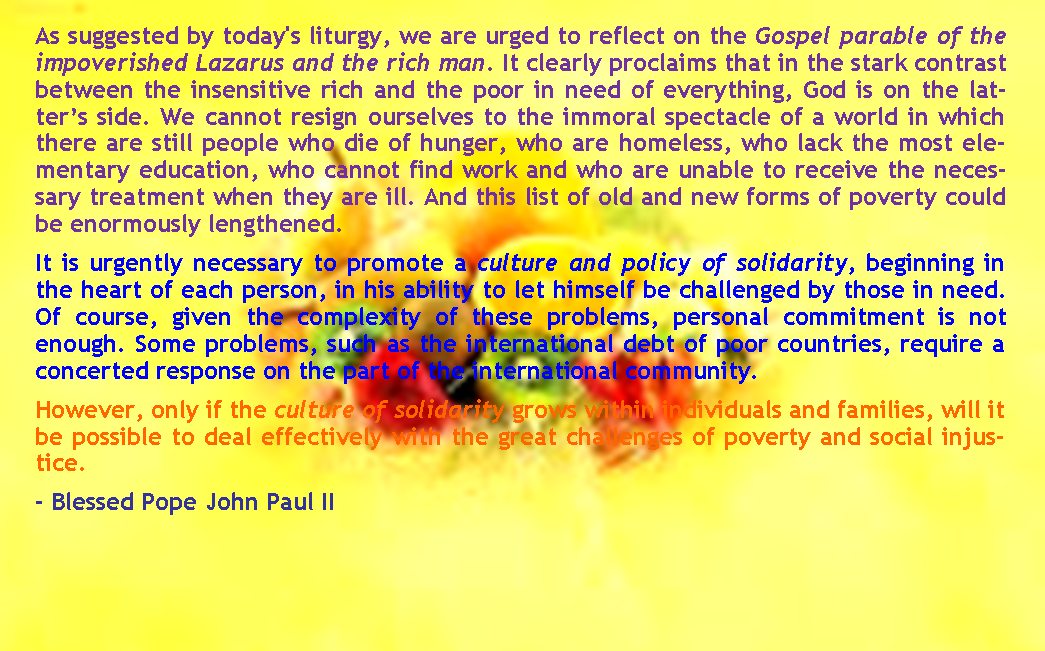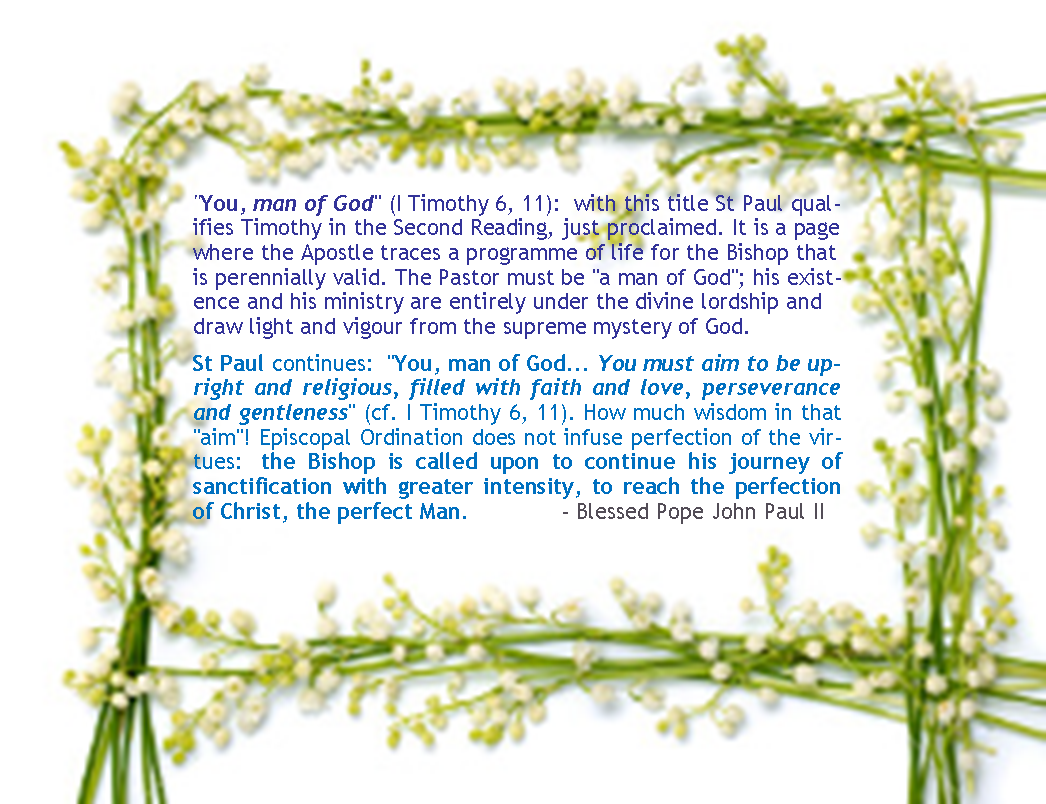|
62 |

|
The Wise Grandfather Priest told us on Sunday 29 September 2013, ‘There are 2 categories of Sins: “Sins of Commission” and “Sins of Omission”. Although this rich man did not kill, rob or commit adultery, he OMITTED to do the things he SHOULD DO, refusing to show compassion to another human being Lazarus. Didn’t he give the big drumstick to his house dog and gave Lazarus NOTHING?’ Imprudent Fellow, if he would just share his “ 满汉全席 ” & BBQ Food with Lazarus, he could look handsome and fit, holding Lazarus’ hand to enter Heaven, resting in Father Abraham’s bosom. But he refused, died of high cholesterol, heart attack and now in the “BBQ Pit”. Do I have compassion on myself; to save my own skin and to avoid falling into the “BBQ Pit”? |
|
Extracted from the holy Gospel according to Luke 16:19-31: Jesus said to the Pharisees, ‘There was a rich man who used to dress in purple and fine linen and feast magnificently every day. And at his gate there lay a poor man called Lazarus, covered with sores, who longed to fill himself with the scraps that fell from the rich man’s table. Dogs even came and licked his sores. Now the poor man died and was carried away by the angels to the bosom of Abraham. The rich man also died and was buried. ‘In his torment in Hades he looked up and saw Abraham a long way off with Lazarus in his bosom. So he cried out, “Father Abraham, pity me and send Lazarus to dip the tip of his finger in water and cool my tongue, for I am in agony in these flames.” “My son,” Abraham replied “remember that during your life good things came your way, just as bad things came the way of Lazarus. Now he is being comforted here while you are in agony. But that is not all: between us and you a great gulf has been fixed, to stop anyone, if he wanted to, crossing from our side to yours, and to stop any crossing from your side to ours.” ‘The rich man replied, “Father, I beg you then to send Lazarus to my father’s house, since I have five brothers, to give them warning so that they do not come to this place of torment too.” “They have Moses and the prophets,” said Abraham “let them listen to them..” “Ah no, father Abraham,” said the rich man “but if someone comes to them from the dead, they will repent.” Then Abraham said to him, “If they will not listen either to Moses or to the prophets, they will not be convinced even if someone should rise from the dead.”’
Sharing:
It was the 26th Sunday in Ordinary Time on 29 September 2013.
Here are the Readings that were read in the Eucharistic Celebrations all over the world on the same day (see previous page): 1st Reading: Amos 6:1, 4-7, Responsorial: Psalm 146:6-10, 2nd Reading: 1 Timothy 6:11-16 & Gospel Reading: Luke 16:19-31 (see above).
We have extracted the Homilies of Blessed Pope John Paul II, Pope Benedict XVI & Pope Francis I based on the aforesaid Readings to share with you, so that you could similarly be encouraged: |

|
JOHN PAUL II ANGELUS Sunday, 27 September 1998
Dear Brothers and Sisters,
1. Today is the liturgical memorial of St Vincent de Paul, patron of all charitable associations. In considering this distinguished witness to the love of God and one's brethren, especially the poor and abandoned, we must turn our attention to one of the greatest challenges facing our conscience: the truly intolerable contrast between that portion of humanity which enjoys all the advantages of economic well-being and scientific progress, and the vast number of those who live in conditions of extreme poverty. In my Apostolic Letter Tertio millennio adveniente, I insisted that “commitment to justice and peace” should be “a necessary condition for the preparation and celebration of the Jubilee” (n. 51). In view of the Holy Year now at hand, it is therefore necessary to ask ourselves: where are we with our commitment?
As suggested by today's liturgy, we are urged to reflect on the Gospel parable of the impoverished Lazarus and the rich man. It clearly proclaims that in the stark contrast between the insensitive rich and the poor in need of everything, God is on the latter’s side. We cannot resign ourselves to the immoral spectacle of a world in which there are still people who die of hunger, who are homeless, who lack the most elementary education, who cannot find work and who are unable to receive the necessary treatment when they are ill. And this list of old and new forms of poverty could be enormously lengthened.
2. It is urgently necessary to promote a culture and policy of solidarity, beginning in the heart of each person, in his ability to let himself be challenged by those in need. Of course, given the complexity of these problems, personal commitment is not enough. Some problems, such as the international debt of poor countries, require a concerted response on the part of the international community.
However, only if the culture of solidarity grows within individuals and families, will it be possible to deal effectively with the great challenges of poverty and social injustice. As I recommended in my Apostolic Letter Dies Domini, Sunday must be a special day of charity if it is to be spent as the Lord’s Day in every respect.
3. May the Blessed Virgin help us all to grow in our sense of brotherhood. May Mary, invoked in the Litany of Loreto as Comfort of the Afflicted, also use our arms and our hearts to bring her comfort and motherly concern to all who are in need. --------------------------------------------------------------------------------------
To the English-speaking pilgrims and visitors the Holy Father said: Upon all the English-speaking visitors and pilgrims I invoke the loving intercession of Mary, Queen of Heaven. May God bless you and your families.
INAUGURATION OF THE 10th ORDINARY GENERAL ASSEMBLY HOMILY OF JOHN PAUL II Sunday 30 September 2001
1. "The Bishop, Servant of the Gospel of Jesus Christ for the Hope of the World".
This is the theme for the work of the Tenth General Ordinary Assembly of the Synod of Bishops, which we are now opening in the name of the Lord. The Synod follows the series of Special Assemblies that dealt with the Churches of the six continents, in preparation for the Great Jubilee of the Year 2000.
They all had in common the challenge of evangelization, as one can discover by reading the post-Synodal Apostolic Exhortations that have been published. Today's Synod can be placed, both in continuity with the preceding Ordinary Assemblies, dedicated to the various vocations of the People of God: the laity in 1978, the priests in 1990, consecrated life in 1994 and also it can be taken as a further response to the call for the new evangelization. Thus the treatment on Bishops fills out the picture of an ecclesiology of communion and mission, which we must keep before us.
With great joy I welcome you, dear and venerated Brothers in the Episcopate, coming from all over the world. Meeting and working together, under the guidance of the Successor of Peter, reveals "that all the Bishops in hierarchical communion partake of the solicitude for the Universal Church" (Christus Dominus, n. 5). I extend my cordial welcome to the other members of the Assembly and to those who in the following days will cooperate in its efficient development. In a special way, I thank the Secretary General of the Synod, Cardinal Jan Pieter Schotte, along with his collaborators, who actively prepared the present Synod session. |

|
2. On Christmas Eve of 1999, inaugurating the Great Jubilee, after opening the Holy Door, I crossed it holding in my hands the Book of the Gospels. This was a highly symbolic gesture. The Gospels contain the agenda of the Synod we are beginning today on the theme: "The Bishop, Servant of the Gospel of Jesus Christ for the Hope of the World".
The Bishop is "minister, servant". The Church is at the service of the Gospel. "Ancilla Evangelii" (servant of the Gospel): this is how it could be defined, echoing the words the Virgin Mary used at the Annunciation of the angel. Then Mary said "Ecce ancilla Domini" (Behold the servant of the Lord); the Church continues to say today "Ecce ancilla Evangelii" (Behold the servant of the Gospel).
"Propter spem mundi" (For the hope of the world). The hope of the world lies in Christ. In Him, the expectations of humanity find a real and solid foundation. The hope of every human being comes from the Cross, sign of the victory of love over hate, of forgiveness over revenge, of truth over falsehood, of solidarity over egoism. Our task is to make the proclamation of salvation to the men and women of our time. The evangelical beatitude of poverty, is a precious message for the Synod Assembly that we are beginning. In fact, poverty is an essential trait of the person of Jesus and His ministry of salvation and represents one of the indispensable requirements for the evangelical proclamation to be heard and welcomed by today's humanity.
Listening to the First Reading, from the Prophet Amos, and paying attention to the famous parable of the "rich man" and poor Lazarus, as told by the Evangelist St Luke, we, venerable Brothers, are compelled to look into our hearts to discern what is our attitude towards earthly goods and the use we make of them. We are asked to verify to what extent the personal and community conversion to an effective evangelical poverty has taken place in the Church. I recall the words from Vatican Council II: "Just as Christ carried out the work of redemption in poverty and persecution, so the Church is called to follow the same route that she might communicate the fruits of salvation to men" (Lumen Gentium, n. 8).
4. The route of poverty will allow us to transmit to our contemporaries the "fruits of salvation". As Bishops we are called upon, therefore, to be poor at the service of the Gospel. To be servants of the revealed word, who when needed will raise their voices in defence of the least, denouncing the abuses against those whom Amos called the "carefree" and the "revellers". To be prophets is to point out with courage the social sins that are the fruit of consumerism, hedonism, and an economy that produces an unacceptable gap between luxury and misery, between the few "rich men" and the many "Lazarus's" condemned to misery. In every age, the Church was close to the least, and has had holy Pastors who sided, like intrepid apostles of charity, with the poor.
But for the Pastors' Word to be credible, they must give proof of conduct detached from private interests and attentive towards the weaker ones. They must give an example to the community entrusted to them, teaching and supporting the synthesis of principles of solidarity and social justice that make up the social doctrine of the Church.
St Paul continues: "You, man of God... You must aim to be upright and religious, filled with faith and love, perseverance and gentleness" (cf. I Timothy 6, 11). How much wisdom in that "aim"! Episcopal Ordination does not infuse perfection of the virtues: the Bishop is called upon to continue his journey of sanctification with greater intensity, to reach the perfection of Christ, the perfect Man.
The Apostle adds: "Fight the good fight of faith and seek to reach eternal life... " (cf. I Timothy 6,12). Striving for the Kingdom of God, dear Brothers, we face our daily toils for the faith, not looking for any other reward but the one God will give us at the end. We are called upon to give this "noble profession of faith before many witnesses" (cf. I Tm 6,12). The splendour of faith thus bears witness: it is the reflection of the glory of Christ in the words and gestures of each of His faithful ministers.
St Paul concludes: "I charge you to keep the commandment unstained and free of reproach, until the appearing of our Lord Jesus Christ" (cf. I Tm 6, 14). "The commandment"! This word contains all of Christ: His Gospel, His witness of love, the gift of His Spirit that fulfils the law.
The Apostles received this inheritance from Him and entrusted it to us, to be preserved and handed on intact until the end of time.
Continue next page …
6 October 2013
|